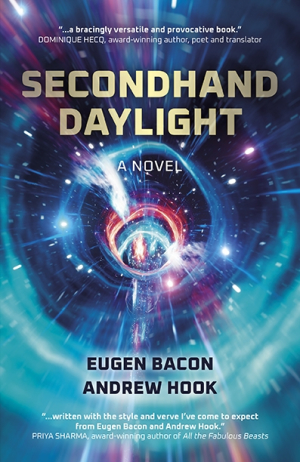Secondhand Daylight
- 2023 INDIES Finalist
- Finalist, Science Fiction (Adult Fiction)
In Eugen Bacon and Andrew Hook’s literary science fiction novel Secondhand Daylight, time travel complements a search for belonging.
Green is an outsider who has no ambition, family, or friends. The peak of his week is going to the disco at the Sarah Sands Hotel; he knows the club and its patrons well. One night, he spots a woman he’s never seen before. On the dance floor, he moves toward her; a pulse shoots through his body, and he wakes in the street two hours later. The incident sets off a series of uncontrollable blackouts that Green discovers are time jumps into the future. Green realizes that he needs to stop what is happening or he will keep jumping into infinity.
Centuries in the future, Zada is sent into the past by Green’s AI alter ego to intercept him and stop the jumps from happening. Carrying an interdimensional tesseract that will reset Green’s timeline once she finds him, Zada goes on the hunt for Green. But Green is an elusive prey, and Zada keeps missing him. Zada realizes that if she fails in her mission, she will be jumping back in time forever.
Secondhand Daylight is a refreshing take on time travel novels. Based in quantum theory, the stumbling blocks of time travel narratives are solved: time is no longer linear, and the Butterfly Effect no longer matters. The implications of immortality, knowing the future, and changing the past are addressed when Green and Zada hunt after each other through time.
Secondhand Daylight is a thrilling science fiction novel about the serendipity of being in the right place at the right time.
Reviewed by
Erika Harlitz Kern
Disclosure: This article is not an endorsement, but a review. The publisher of this book provided free copies of the book to have their book reviewed by a professional reviewer. No fee was paid by the publisher for this review. Foreword Reviews only recommends books that we love. Foreword Magazine, Inc. is disclosing this in accordance with the Federal Trade Commission’s 16 CFR, Part 255.

